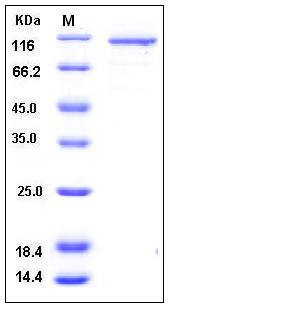Human RSK4 / RPS6KA6 Protein (GST Tag)
PP90RSK4,RSK4
- 100ug (NPP4225) Please inquiry
| Catalog Number | P10147-H09B |
|---|---|
| Organism Species | Human |
| Host | Baculovirus-Insect Cells |
| Synonyms | PP90RSK4,RSK4 |
| Molecular Weight | The recombinant human RSK4/GST chimera consists of 972 amino acids and migrates as an approximately 110 kDa band as predicted in SDS-PAGE under reducing conditions. |
| predicted N | Met |
| SDS-PAGE |  |
| Purity | > 92 % as determined by SDS-PAGE |
| Protein Construction | A DNA sequence encoding the full length of human RSK4 (NP_055311.1) (Met 1-Leu 745) was fused with the GST tag at the N-terminus. |
| Bio-activity | No Kinase Activity |
| Research Area | Immunology |Signal Transduction |Other Related Intracellular Topics |Apoptosis Intracellular Kinases |
| Formulation | Supplied as sterile 50mM Tris, 100mM NaCl, 0.5mM Reduced Glutathione, 10% gly, 0.5mM PMSF, 0.5mM EDTA, pH 8.0 1. Normally 5 % - 8 % trehalose, mannitol and 0.01% Tween80 are added as protectants before lyophilization. Specific concentrations are included in the hardcopy of COA. |
| Background | Ribosomal protein S6 kinase alpha-6, also known as Ribosomal S6 kinase 4, 90 kDa ribosomal protein S6 kinase 6,RSK-4, RSK4 and RPS6KA6, is a protein which belongs to the protein kinase superfamily, AGC Ser/Thr protein kinase family and S6 kinase subfamily. RPS6KA6 contains one AGC-kinase C-terminal domain and two protein kinase domains. RPS6KA6 forms a complex with either ERK1 or ERK2 in quiescent cells. RPS6KA6 shows a high level of homology to three isolated members of the human RSK family. RSK2 is involved in Coffin-Lowry syndrome and nonspecific MRX. The localization of RPS6KA6 in the interval that is commonly deleted in mentally retarded males together with the high degree of amino acid identity with RSK2 suggests that RPS6KA6 plays a role in normal neuronal development. Further mutation analyses in males with X-linked mental retardation must prove that the gene of RPS6KA6 is indeed a novel MRX gene. RPS6KA6 is a serine/threonine kinase that may play a role in mediating the growth-factor and stress induced activation of the transcription factor CREB. RPS6KA6 is activated by multiple phosphorylations on threonine and serine residues. |
| Reference |
